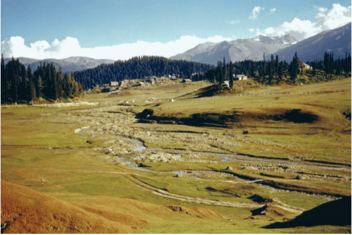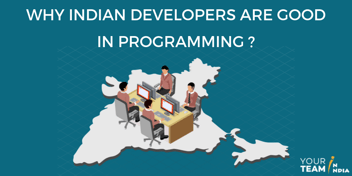Quick Summary: India moved beyond stereotypes. This blog debunks myths to unveil India's true essence, a country that defies categorizations and invites exploration of its layered identity.
Introduction
India, with its diverse cultures, rich history, and vibrant traditions, has often been the subject of various myths and misconceptions.
India, located in South Asia, is the seventh largest country in the world by land area and the second most populated country globally. With a history that spans thousands of years, India is a vibrant hub of diverse languages, religions, and ethnicities, creating a mesmerizing yet intricate tapestry of cultures.
India's geography is as diverse as its cultural heritage, ranging from the snow-capped peaks of the Himalayas to the tropical beaches of the Indian Ocean. Over the centuries, the country has seen the emergence and decline of ancient civilizations, the propagation of influential philosophies, and the rise of a dynamic and rapidly changing modern society.
Key Takeaways
- India is a nation known for its resilience, actively challenging stereotypes, embracing change, and inviting exploration of its dynamic and diverse identity.
- India's technology and innovation prowess highlights its global role in cutting-edge industries.
- The blog showcases India's diverse culture, traditions, and languages, debunking the myths about it while embracing urbanization and modern lifestyles.
Let us embark on a journey to debunk myths about India with an open mind to acknowledge the nuances that define this great nation.
As we unravel the truths that dispel the misconceptions surrounding India, we will gain a deeper understanding of its extraordinary culture and heritage.
Join us on this enlightening expedition to better understand the country.
India Beyond Stereotypes
India is a fascinating country with a rich cultural heritage. However, it is often subjected to oversimplification and stereotypes. One common misconception is that India has a uniform culture, which is far from the truth. The country is a diverse mosaic of cultures, each with unique languages, customs, and traditions. With 29 states and 7 Union Territories, India is a tapestry of cultural richness and celebrates diversity. This is evident in the varied festivals and distinct art forms that are found across the country.
India has long been associated with spiritual practices, but this stereotype is not entirely accurate. While India is indeed a major birthplace of religions and a center of spiritual practices, it is also a modern and dynamic nation. Cities like Mumbai, Delhi, and Chennai are leading centers of technological innovation, and India is a global player in industries ranging from information technology to pharmaceuticals. The contrast between ancient spiritual wisdom and contemporary technological prowess epitomizes India's multifaceted identity.
Today, India boasts a strong economy, technological advancements, and a growing youth population, driving progress in various fields.
Economic Realities vs. Myths
India's economy is often misunderstood due to myths that oversimplify its complexity. Despite the challenges of poverty and inequality, India has appeared as one of the world's fastest-growing economies.
Despite challenges, India's economic policies exhibit resilience and adaptability. Initiatives like "Make in India" and infrastructure development projects address bureaucratic red tape and infrastructure gaps. India's commitment to economic reforms and a business-friendly environment contribute to its ability to navigate challenges and foster growth.
India is capturing attention on multiple fronts, making strides in space science and the economy. With the successful launch of Chandraayan-3 on August 23, 2023, India has made remarkable progress in space science and aims to study the solar atmosphere with the Aditya-L1 spacecraft. On the economic front, the International Monetary Fund (IMF) predicts that India will become the world's third-largest economy by 2027, outpacing Japan and Germany.
India's GDP is expected to exceed 5 trillion dollars, and the country is striving to achieve developed economy status by 2047. As India continues to progress in science and prosperity, the future is very promising.
Deloitte predicts India's growth to range from 6.5% to 6.8% between FY23 and FY24,
followed by an average of 6.65% and 7.95% over the next two years.
Another myth revolves around India's success in specific economic fields. The outdated perception of India as primarily an agricultural economy ignores the significant strides made in information technology, pharmaceuticals, and renewable energy sectors. With advancements, India stands as a global leader in software development services and pharmaceutical production, making substantial investments in renewable energy.
There are plenty of opportunities for job seekers in the renewable energy sector. With the rising demand for specialists in this field, professionals in India can explore job opportunities in renewable energy through platforms like Kablio
This signals a diversified and forward-looking economic strategy.
Technology and Innovation
India's technological prowess and innovation have propelled it onto the global stage, challenging stereotypes and reshaping perceptions often associated with traditional practices.
India's software sector is a global powerhouse with leading hubs for innovation. Indian IT professionals contribute to cutting-edge global projects, making India a key player in the digital revolution. Indian-origin CEOs in major global tech companies highlight India's technological capabilities.
India proudly secures the 40th position among 132 economies in the latest Global Innovation Index 2023 rankings by the World Intellectual Property Organization.
Embarking on an upward journey, India's trajectory in the Global Innovation Index has been remarkable—from a commendable rank of 81 in 2015 to an impressive 40 in 2023.
This remarkable feat is a testament to India's rich knowledge capital, the dynamic startup ecosystem, and the incredible contributions made by public and private research organizations. The innovation landscape in India is flourishing, fueled by a collaborative spirit and a commitment to excellence. The continuous climb in the GII ranking indicates that innovation is taking the spotlight in India and is on an upward journey towards becoming a global innovation hub.
India's startups are leading technological breakthroughs and attracting global investments. Government initiatives like "Digital India" and "Startup India" promote innovation and entrepreneurship. India is committed to developing affordable medical solutions and renewable energy sources to address pressing global challenges.
As India continues to invest in research, development, and education, it is poised to play an influential role in shaping the future of technology on a global scale.
Cultural Pluralism and Diversity
India is renowned for its cultural pluralism and diversity, which disproves the notion of a homogeneous Indian culture. India has no singular or uniform identity, as its culture is a rich tapestry of diversity intricately woven through its traditions, cuisine, languages, and clothing.
India, with its vast size and diverse population, is a mosaic of cultures that contribute to the vibrant spectrum of the nation. The challenge that lies ahead is to dispel the myth of monolithic culture and embrace the multitude of expressions that coexist within its borders.
With diverse culinary offerings, the nation reflects its cultural tapestry. Each region has a unique culinary identity, showcasing a gastronomic diversity that reflects the cultural heterogeneity of the country.
The Hindu community has a majority who hold a favorable view of the ruling Bharatiya Janata Party (BJP) and believe that religious diversity is beneficial for the country, with a percentage of 57%.
On the other hand, among those who hold an unfavorable opinion of the BJP, 45% still believe that religious diversity is advantageous for the nation.
India has diverse traditions influenced by historical, religious, and regional factors. Festivals like Diwali, Eid, and Holi showcase coexisting traditions and beliefs with intricate rituals and customs.
India's linguistic and cultural diversity is evident in over 120 major languages and various dialects spoken across the country. Clothing also varies significantly from region to region, reflecting the rich cultural heritage that has evolved over the centuries.
Embrace India's diversity in cuisine, traditions, languages, and clothing to understand its cultural pluralism and overcome the myth of homogeneity.
Women's Empowerment
India has been striving for women's empowerment to overcome stereotypes and ensure equal opportunities. Despite progress, persistent stereotypes about women's status overshadow remarkable achievements and ongoing efforts.
In India, women are stereotyped as being limited to traditional gender roles. This hinders their full potential and perpetuates discrimination. We must challenge societal norms and promote inclusivity and equity to break free from these stereotypes.
In recent years, India has made strides in women's empowerment, with women excelling in science, sports, politics, and business. Icons like Kalpana Chawla and P.V. Sindhu showcase the strength and capability of Indian women.
Efforts towards women's empowerment include programs like Beti Bachao Beti Padhao, economic initiatives, skill development programs, and campaigns against gender-based violence. These initiatives aim to address gender discrimination and create an environment where women can thrive.
Grassroots movements and advocacy groups led by women play a critical role in promoting gender equality by challenging stereotypes and patriarchal structures.
Although challenges still exist, the accomplishments and continuous efforts in women's empowerment in India demonstrate a strong commitment to creating a more inclusive and fair society. Acknowledging women's achievements and supporting initiatives that empower them contribute to a collective effort to challenge stereotypes and build a society where every woman can reach her full potential.
Education and Knowledge
Education is essential for progress but misconceptions about India's education system persist. There are discrepancies in infrastructure, resources, and teaching quality across regions, requiring focused efforts to ensure equal access to quality education nationwide. High dropout rates, especially among girls, and a gap between the curriculum and industry needs are significant challenges that hinder the education system's comprehensive development.
Despite all this, India has made significant progress in the field of education, with a focus on increasing enrollment rates and improving literacy levels. Various initiatives, such as the Sarva Shiksha Abhiyan (Education for All) and the Midday Meal Scheme, have improved access to education, particularly in rural areas. The emphasis on digital learning and the use of technology in education further highlight the system's adaptability.
India's higher education system has achieved remarkable success, with prestigious institutions such as the Indian Institutes of Technology (IITs) and Indian Institutes of Management (IIMs) gaining global recognition for their academic excellence. The contributions of the Indian diaspora to research, technology, and academia also highlight the international impact of India's education system.
Efforts are needed to bridge the gap between misconceptions and the reality of education in India. Addressing infrastructure disparities, adapting curricula, and promoting inclusivity will lead to a more equitable education system. Recognizing challenges and successes is integral to fostering education as a catalyst for progress.
In February 2023, the Indian government allocated $13.67 billion for EdTech, skill development, and R&D. The funds will be used for reskilling and upskilling in areas like Big Data, Digital Marketing, and more. U.S. and Indian universities will collaborate for workshops and training programs.
Furthermore, the government plans to establish three centers of excellence for artificial intelligence and introduce industry 4.0 courses in coding, AI, IoT, and soft skills. The goal is to equip students with skills for future work demands. Indian and U.S. universities will collaborate to design and deliver tailored courses for Indian students and industry.
Urbanization and Modern Lifestyle
India has long been associated with rural landscapes and traditional lifestyles. However, it is important to dispel the notion that India is purely rural and embrace the transformative impact of urbanization and modern lifestyles. In recent years, urbanization has reshaped India's demographic landscape, particularly in metropolitan centers like Mumbai, Delhi, and Bangalore, which are not only vibrant hubs of modernity, innovation, and economic growth but also smart cities that coexist with traditional values.
India's urbanization trend has led to a dynamic cosmopolitan culture that blends traditional values with diverse cultural elements. The urban population in India has witnessed a significant shift in their lifestyles, which now reflect the fusion of modernity and tradition. The rise of the information technology sector, digital connectivity, and e-commerce has further catalyzed this transformation, connecting urban India to the global community.
However, this shift has brought about infrastructural and environmental concerns, including congestion, pollution, and resource depletion. Therefore, it is crucial to strike a balance between development and sustainability to ensure that the benefits of urbanization are inclusive and sustainable.
India is embracing the challenge of redefining its identity by recognizing the multifaceted nature of its story, where tradition and modernity converge. India's ability to adapt and evolve is reflected in its coexistence of urban and rural landscapes and traditional and modern lifestyles. Appreciating this diversity is crucial for understanding India's journey into a future that combines heritage with progress.
Social Media and Connectivity
Social media and connectivity are integral parts of modern life. However, many myths surround their usage and impact on society. Understanding the realities of social media and connectivity is crucial to navigating the digital landscape effectively. One myth is that social media is only used for frivolous interactions. But in reality, it's a powerful tool for communication, information, and community building. People of all ages use social media, and it's not just confined to specific demographics.
Platforms like Facebook, Twitter, and Instagram serve as channels for real-time news updates, global conversations, and meaningful connections.
As of January 2023, India boasted a social media user base of 467.0 million, constituting 32.8 percent of the total population. According to Meta's advertising resources, Facebook alone accounted for 314.6 million users in the country at the beginning of the year, reaching 22.1 percent of the population.
Considering Facebook's age restriction policy (13 and above), it's noteworthy that 28.2 percent of the eligible audience in India engaged with the platform in 2023. Meta's advertising tools also revealed that Instagram had 229.6 million users in India, with its advertising reach extending to 16.1 percent of the total population. Additionally, Snapchat's advertising resources indicated that Snapchat had 172.5 million users in India in early 2023.
And the numbers don’t end here. Social media fosters connectivity and serves as a virtual space to share experiences, ideas, and support. And the below statistics by HubSpot successfully share that!
There is growing speculation that social search could eventually replace traditional search engines such as Google, though it is still too early to make such a claim.
Nonetheless, social search is gaining momentum in 2023 and will continue to do so as people are moving toward Social Media platforms even to make their purchases and search for brands.
However, addressing concerns about data privacy, cyberbullying, and responsible online behavior is imperative. Recognizing the transformative potential of social media and connectivity leads to a more empowered global community.
Infrastructure and Development
India's development story is often overshadowed by persistent myths surrounding its infrastructure. It is imperative to dispel these misconceptions to recognize the ambitious projects and ongoing improvements transforming the nation's transportation, energy, and urban planning sectors.
One common myth suggests that India lacks robust infrastructure development. However, in reality, the country has made substantial progress in recent years.
India is set to double its infrastructure spending to around Rs 143 lakh crore between 2024 and 2030, with a significant portion of this investment, approximately Rs 36.6 lakh crore, allocated for green initiatives. These impressive projections were shared by CRISIL, a leading research and rating agency, during the India Infrastructure Conclave 2023 held in New Delhi.
The central theme of the conclave centered around "Constructing and financing sustainable infrastructure," placing particular emphasis on financial support and skill development for sustainable solutions within the realms of energy, transportation, and urban development.
India aims to expand renewable energy capacity, focusing on solar and wind power. Initiatives like the National Solar Mission and Ujwal DISCOM Assurance Yojana (UDAY) promote sustainable energy development and grid efficiency, proving sufficient infrastructure exists.
Global Influence
India is a significant player on the global stage, fostering strategic alliances and partnerships beyond regional borders. As a member of the United Nations, India advocates for climate change, sustainable development, and global health.
Trade plays a pivotal role in India's global influence, with industries such as information technology, pharmaceuticals, and renewable energy contributing to the global economy. India is at the forefront of addressing pressing global challenges, like climate change and public health crises, and initiatives like the International Solar Alliance demonstrate its commitment to sustainable development.
The Indian diaspora significantly enhances India's global influence, fostering cultural exchange, economic ties, and diplomatic connections.
Wrapping Up!
To truly appreciate India, it is imperative to move beyond these stereotypes. Embracing the diversity of its cultures, acknowledging its modernity alongside its ancient traditions, and recognizing the evolving narratives that define it, allows for a richer and more accurate understanding of this multifaceted nation. By debunking these myths, we unveil the true essence of India, a country that defies simplistic categorizations and invites exploration of its layered identity.
India is shaping the global narrative through diplomatic engagements, economic contributions, and active participation in addressing global challenges, showcasing its enduring impact on the world stage.
For several years, YTII has been a platform for showcasing top remote Indian talent to the world, breaking stereotypes about India's growth.
.png?width=800&height=200&name=hire%20indian%20developers%20(1).png)








